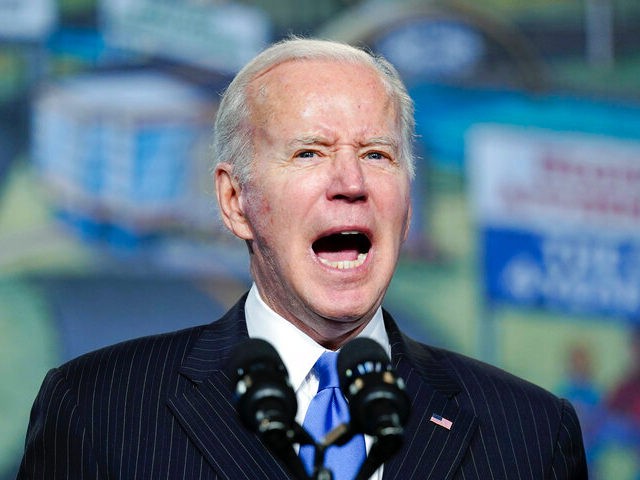The latest push by Democrats and the establishment media to repair President Joe Biden’s standing with the American public on economic issues improbably attempts to crown the president with the laurel of fiscal responsibility.
In remarks at the White House Wednesday, Biden plans to claim credit for deficit reduction and pat himself on the back because the federal government will likely shrink the national debt this quarter. That will be the first quarter in six years the government has paid down some debt. This is part of the scramble to create some positive economic news ahead of the midterm elections.
The Biden administration has not, of course, been known as a paragon of fiscal responsibility. It successfully pushed through a $1.9 trillion spending bill that it described as a “rescue plan” even though the economy was already recovering from the pandemic thanks to the Trump administration’s measures. At the time, Obama administration veterans like Larry Summers joined conservatives in warning that the excessive spending would set off an inflation inferno but the Biden administration and Capitol Hill Democrats brushed off such warnings.
The Biden administration would have added even more fuel to the inflationary fires in the form of its $2 trillion Build Back Better bill had it not been thwarted by Republicans and the heroic stand of Senator Joe Manchin (D-WV) to defy his party’s leadership. The measures in that bill that purported to introduce some fiscal discipline were all backloaded so far into the future that no one not named Jen Psaki had confidence that they would ever be enacted. They were universally understood to be accounting gimmicks that would do nothing to reduce inflationary pressures. In reality, it promised rising deficits and inflation from now until kingdom come.
So how does the Biden administration expect to sell the president fiscally responsible? The U.S. Treasury said on Wednesday that it would reduce the sale of longer-term debt for a third straight time and unexpectedly guided that it may make further reductions. Earlier this week, Treasury said that it forecasts that it will reduce the federal debt by $26 billion in debt in April through June quarter this year.
The reason this is possible, however, is that inflation has pumped up the federal government revenues. When nominal incomes of workers and profits of businesses rise, so do tax revenues. Inflation is great for the government even as it drives up the cost of living for American workers. The same thing is happening at the state and local level, where public budgets are unexpectedly overflowing with revenue thanks to inflation.
The end of pandemic aid also flatters the figures on an annual basis. Spending is coming down because the programs authorized to fend off a prolonged slump have been allowed to expire, much to the chagrin of many Democrats.
Finally, it’s worth keeping in mind that the Biden administration’s attempts to unwind the Trump administration’s tax reforms have been largely stymied. One reason revenues are as good as they are is that the Trump tax cuts were pro-growth. The current revenue boom is taking place through the tax code President Donald Trump put in place.
In any case, this is likely to be short-lived. The Treasury said it expect to issue $182 billion in debt from July to September. So by the time the midterms arrive, we’ll be adding to the debt once again.
It’s easy to see why the Biden administration is desperately trying to claim credit for debt reduction. It is incredibly unpopular, especially on economic issues. But the Biden administration’s tactic of trying to dissemble its way back into popularity has time and again faltered on the hard reality of inflation. Inflation was imaginary, transitory, then it was a good thing, then it was the fault of corporate greed, and recently it is Putin Price Hikes.
The public is unlikely to be fooled by this sudden change from New Deal-style expander of government to fiscally austerity no matter what pronouns, verbs, or adjectives Biden decides to identify with.

COMMENTS
Please let us know if you're having issues with commenting.